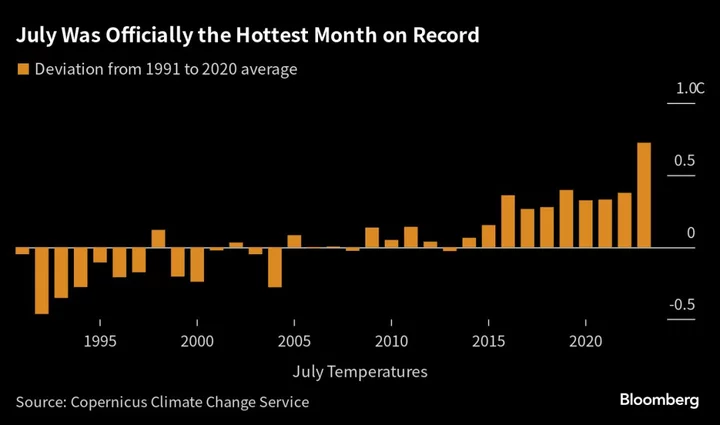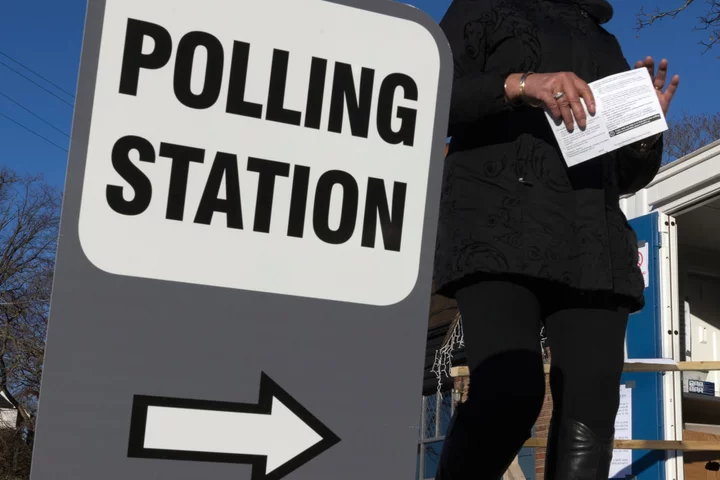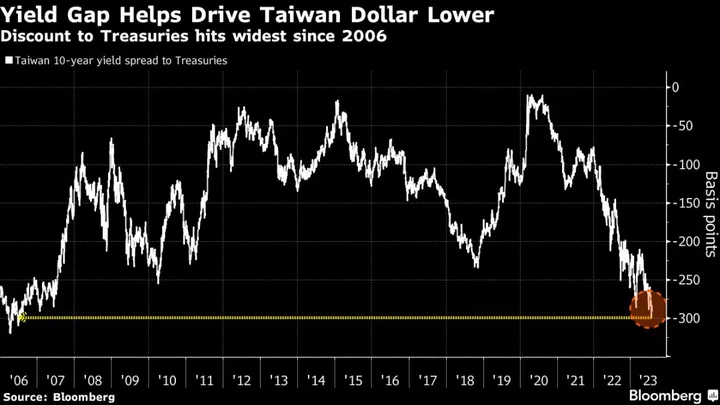
Analysis-Biden's China tech curbs to keep investors sidelined, fearing more steps
By Kane Wu and Michael Martina HONG KONG/WASHINGTON (Reuters) -President Joe Biden's move to prohibit some U.S. technology investments in
2023-08-10 18:45

Detroit police chief says 'poor investigative work' led to arrest of Black mom who claims facial recognition technology played a role
Detroit's police chief on Wednesday blamed "poor investigative work," not the use of facial recognition technology, for the arrest of a Black mother who claims in a lawsuit that she was falsely arrested earlier this year while eight months pregnant.
2023-08-10 12:27

Biden Narrows China Investment Order as US Seeks Better Ties
President Joe Biden imposed limits on US investments in China as part of a push to restrict the
2023-08-10 05:58

Congresswoman Waters 'deeply concerned' about PayPal's stablecoin launch
Democrat Congresswoman Maxine Waters said on Wednesday she was "deeply concerned" about payment giant PayPal launching its own
2023-08-10 02:20

July Was the Hottest Month on Record
July was officially Earth’s hottest month on record, causing the Antarctic to shrink at a record pace and
2023-08-09 16:20

UK’s Voter Register Was Hacked. No One Noticed for 15 Months
Hackers were able to access UK voter registers undetected for 15 months, the Electoral Commission said, raising questions
2023-08-09 15:59

Oxford scientists find no evidence to suggest Facebook not good for wellbeing
There is no evidence to suggest using Facebook is detrimental to wellbeing, Oxford scientists have said, challenging the view that the social media platform is linked to psychological harm. Researchers from the University’s Oxford Internet Institute analysed data from nearly a million people across 72 countries over 12 years – in the largest study of its kind – to understand more about the impact of Facebook on wellbeing. Professor Andrew Przybylski, who co-led the research published in the journal Royal Society Open Science, said: “We examined the best available data carefully – and found they did not support the idea that Facebook membership is related to harm – quite the opposite. “In fact, our analysis indicates Facebook is possibly related to positive well-being.” The research looked at Facebook data from 2008 to 2019, going back to when the platform was in its early stages. “We examined 72 countries’ per capita active Facebook users in males and females in two age brackets, 13-34 years and 35+ years,” the researchers said. The results also showed the association between using Facebook and wellbeing was slightly more positive for males as well as for younger people. Writing in the research paper, the authors said: “Although reports of negative psychological outcomes associated with social media are common in academic and popular writing, evidence for harms is, on balance, more speculative than conclusive.” Professor Matti Vuorre, also of the Oxford Internet Institute, who co-led the study, said: “Our findings should help guide the debate surrounding social media towards more empirical research foundations. “We need more transparent collaborative research between independent scientists and the technology industry to better determine how, when and why modern online platforms might be affecting their users.” Commenting on the study, Peter Etchells, professor of psychology and science communication at Bath Spa University, said: “This is a fascinating study that attempts to link Facebook uptake with measures of mental wellbeing in a broad-strokes manner, using data from over 70 countries. “Contrary to popular sentiment, the researchers didn’t find a negative association between the two; instead, it was generally the case that there were positive associations between country-level Facebook uptake and mental wellbeing. “To my mind, the value in this study lies in proof of principle – it demonstrates that it’s possible to leverage industry data to address meaningful questions about how digital technology interacts with our mental health.” But Prof Etchells said there were some caveats associated with the findings – which the study authors have addressed. He said: “This is a descriptive study, and as such cannot tell us anything about causation – that is, we don’t know how, if, or to what extent, changes in Facebook adoption drive changes in mental wellbeing. “Wellbeing is a complex phenomenon, and even in the context of social media use, we need to be careful drawing any firm conclusions by looking at how people use a single platform such as Facebook.” Read More Move fast and beat Musk: The inside story of how Meta built Threads Japan's tech investor SoftBank trims losses and promises offensive turnaround Chatbots sometimes make things up. Not everyone thinks AI's hallucination problem is fixable Charity boss speaks out over ‘traumatic’ encounter with royal aide Ukraine war’s heaviest fight rages in east - follow live
2023-08-09 11:59

No evidence to suggest Facebook not good for wellbeing, Oxford scientists say
There is no evidence to suggest using Facebook is detrimental to wellbeing, Oxford scientists have said, challenging the view that the social media platform is linked to psychological harm. Researchers from the University of Oxford’s Oxford Internet Institute analysed data from nearly a million people across 72 countries over 12 years – in the largest study of its kind – to understand more about the impact of Facebook on wellbeing. Professor Andrew Przybylski, who co-led the research published in the journal Royal Society Open Science, said: “We examined the best available data carefully – and found they did not support the idea that Facebook membership is related to harm – quite the opposite. “In fact, our analysis indicates Facebook is possibly related to positive well-being.” The research looked at Facebook data from 2008 to 2019, going back to when the platform was in its early stages. “We examined 72 countries’ per capita active Facebook users in males and females in two age brackets, 13-34 years and 35+ years,” the researchers said. The results also showed the association between using Facebook and wellbeing was slightly more positive for males as well as for younger people. It was generally the case that there were positive associations between country-level Facebook uptake and mental wellbeing Prof Peter Etchells Writing in the research paper, the authors said: “Although reports of negative psychological outcomes associated with social media are common in academic and popular writing, evidence for harms is, on balance, more speculative than conclusive.” Professor Matti Vuorre, also of the Oxford Internet Institute, who co-led the study, said: “Our findings should help guide the debate surrounding social media towards more empirical research foundations. “We need more transparent collaborative research between independent scientists and the technology industry to better determine how, when and why modern online platforms might be affecting their users.” Commenting on the study, Peter Etchells, professor of psychology and science communication at Bath Spa University, said: “This is a fascinating study that attempts to link Facebook uptake with measures of mental wellbeing in a broad-strokes manner, using data from over 70 countries. “Contrary to popular sentiment, the researchers didn’t find a negative association between the two; instead, it was generally the case that there were positive associations between country-level Facebook uptake and mental wellbeing. “To my mind, the value in this study lies in proof of principle – it demonstrates that it’s possible to leverage industry data to address meaningful questions about how digital technology interacts with our mental health.” But Prof Etchells said there were some caveats associated with the findings – which the study authors have addressed. He said: “This is a descriptive study, and as such cannot tell us anything about causation – that is, we don’t know how, if, or to what extent, changes in Facebook adoption drive changes in mental wellbeing. “Wellbeing is a complex phenomenon, and even in the context of social media use, we need to be careful drawing any firm conclusions by looking at how people use a single platform such as Facebook.” Read More Charity boss speaks out over ‘traumatic’ encounter with royal aide Ukraine war’s heaviest fight rages in east - follow live Ozzy Osbourne PlayStation tweet which failed to reveal link to Sony banned Harry and Meghan ring young online innovators after funding awards James Bulger’s mother condemns ‘disgusting’ AI clips on TikTok of murdered son
2023-08-09 11:59

Foreign Outflows Give Taiwan Asia’s Worst-Performing Currency
Taiwan’s dollar had a rough run this quarter and investors fleeing Asia’s lowest-yield market outside of Japan threaten
2023-08-09 11:50

Superconductor Stocks Drop in Korea Amid Doubts on Breakthrough
South Korean stocks that had skyrocketed on perceived links to superconductors fell for a second day Wednesday after
2023-08-09 10:54

Judge schedules Friday hearing on protective order in election subversion case against Trump
US District Judge Tanya Chutkan scheduled a hearing for Friday at 10 a.m. ET on the scope of a protective order -- the rules imposed for the handling of evidence -- in the special counsel's election subversion case against former President Donald Trump.
2023-08-09 06:23

Banks Face Stepped-Up Scrutiny From Fed Over Crypto Activities
The Federal Reserve said it is stepping up scrutiny of lenders’ involvement in digital assets, the latest move
2023-08-09 05:56
